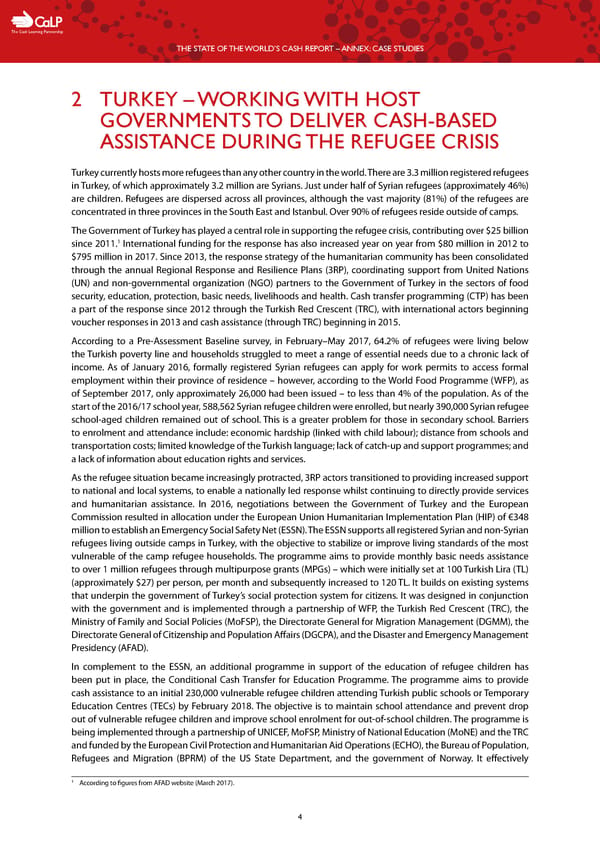C The Cash Learning Partnership THE STATE OF THE WORLD’S CASH REPORT – ANNEX: CASE STUDIES 2 TURKEY – WORKING WITH HOST GOVERNMENTS TO DELIVER CASH-BASED ASSISTANCE DURING THE REFUGEE CRISIS Turkey currently hosts more refugees than any other country in the world. There are 3.3 million registered refugees in Turkey, of which approximately 3.2 million are Syrians. Just under half of Syrian refugees (approximately 46%) are children. Refugees are dispersed across all provinces, although the vast majority (81%) of the refugees are concentrated in three provinces in the South East and Istanbul. Over 90% of refugees reside outside of camps. The Government of Turkey has played a central role in supporting the refugee crisis, contributing over $25 billion 1 since 2011. International funding for the response has also increased year on year from $80 million in 2012 to $795 million in 2017. Since 2013, the response strategy of the humanitarian community has been consolidated through the annual Regional Response and Resilience Plans (3RP), coordinating support from United Nations (UN) and non-governmental organization (NGO) partners to the Government of Turkey in the sectors of food security, education, protection, basic needs, livelihoods and health. Cash transfer programming (CTP) has been a part of the response since 2012 through the Turkish Red Crescent (TRC), with international actors beginning voucher responses in 2013 and cash assistance (through TRC) beginning in 2015. According to a Pre-Assessment Baseline survey, in February–May 2017, 64.2% of refugees were living below the Turkish poverty line and households struggled to meet a range of essential needs due to a chronic lack of income. As of January 2016, formally registered Syrian refugees can apply for work permits to access formal employment within their province of residence – however, according to the World Food Programme (WFP), as of September 2017, only approximately 26,000 had been issued – to less than 4% of the population. As of the start of the 2016/17 school year, 588,562 Syrian refugee children were enrolled, but nearly 390,000 Syrian refugee school-aged children remained out of school. This is a greater problem for those in secondary school. Barriers to enrolment and attendance include: economic hardship (linked with child labour); distance from schools and transportation costs; limited knowledge of the Turkish language; lack of catch-up and support programmes; and a lack of information about education rights and services. As the refugee situation became increasingly protracted, 3RP actors transitioned to providing increased support to national and local systems, to enable a nationally led response whilst continuing to directly provide services and humanitarian assistance. In 2016, negotiations between the Government of Turkey and the European Commission resulted in allocation under the European Union Humanitarian Implementation Plan (HIP) of €348 million to establish an Emergency Social Safety Net (ESSN). The ESSN supports all registered Syrian and non-Syrian refugees living outside camps in Turkey, with the objective to stabilize or improve living standards of the most vulnerable of the camp refugee households. The programme aims to provide monthly basic needs assistance to over 1 million refugees through multipurpose grants (MPGs) – which were initially set at 100 Turkish Lira (TL) (approximately $27) per person, per month and subsequently increased to 120 TL. It builds on existing systems that underpin the government of Turkey’s social protection system for citizens. It was designed in conjunction with the government and is implemented through a partnership of WFP, the Turkish Red Crescent (TRC), the Ministry of Family and Social Policies (MoFSP), the Directorate General for Migration Management (DGMM), the Directorate General of Citizenship and Population Affairs (DGCPA), and the Disaster and Emergency Management Presidency (AFAD). In complement to the ESSN, an additional programme in support of the education of refugee children has been put in place, the Conditional Cash Transfer for Education Programme. The programme aims to provide cash assistance to an initial 230,000 vulnerable refugee children attending Turkish public schools or Temporary Education Centres (TECs) by February 2018. The objective is to maintain school attendance and prevent drop out of vulnerable refugee children and improve school enrolment for out-of-school children. The programme is being implemented through a partnership of UNICEF, MoFSP, Ministry of National Education (MoNE) and the TRC and funded by the European Civil Protection and Humanitarian Aid Operations (ECHO), the Bureau of Population, Refugees and Migration (BPRM) of the US State Department, and the government of Norway. It effectively 1 According to figures from AFAD website (March 2017). 4
 The State of the World's Cash | Case Studies Page 5 Page 7
The State of the World's Cash | Case Studies Page 5 Page 7